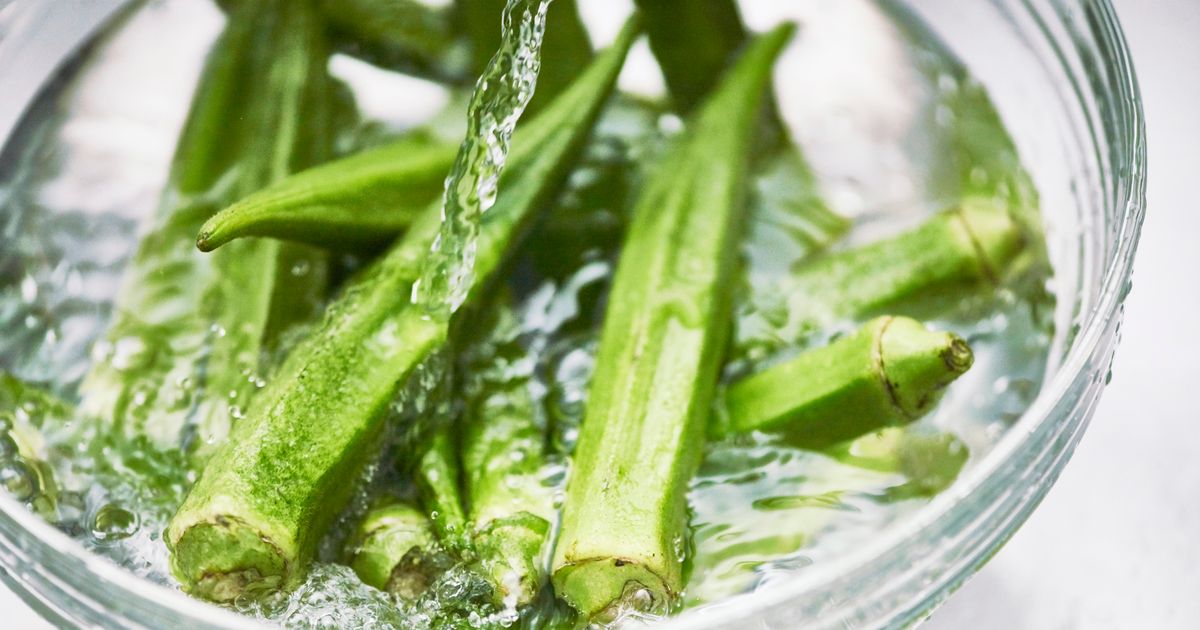TikTok Claims ‘Okra Water’ Can Clear Your Skin And Lube You Up — Experts Have Thoughts

The wellness world has always been rife with questionable-sounding trends, and the rise of TikTok has only added fuel to the fire. The latest wellness trend everyone’s talking about on the social media platform is okra water, which promises smoother and clearer skin, a more efficient digestive system, better lubrication, a more balanced vaginal pH, and the ability to nourish the body with vitamins and minerals that it can be difficult to get enough of.
But how legit is okra water, anyway? Does this slimy liquid really have health benefits, or is it just the latest “here today, gone tomorrow” wellness trend? We asked registered dietitians — here’s what they had to say.
Advertisement
What is okra water?
First, what is okra water, and how do you make it?
“Okra water is water you drink after soaking okra for 24 hours,” explained Amy Goldsmith, a registered dietitian at Kindred Nutrition. “To make okra water, you cut five to six pieces of okra into smaller pieces and add them to an airtight container, like a Mason jar, with 16 ounces of water.” After letting it sit in the refrigerator for 24 hours, you can strain it and drink it.
Advertisement
Sophie Lauver, a registered dietitian at Aeroflow Diabetes, added that while Goldsmith’s recipe is a great blueprint, okra water is very new, and there’s not necessarily an “official” recipe. “The goal is for it to take on a thicker, gel-like texture due to okra’s mucilage,” she said.
The (potential) benefits of okra water.
Like most trendy wellness waters, proponents of okra water claim it can do everything from balancing vaginal pH to curing acne. It’s hard for registered dietitians to say what the exact benefits of okra water are because it hasn’t been around long, but Lauver said the only evidence we really have about okra water’s benefits has to do with the health benefits of okra as a vegetable.
Advertisement
“We do know that okra is a very nutritious vegetable and is rich in soluble fiber, which can help improve blood glucose and reduce cholesterol,” Lauer said. “Its insoluble fiber helps keep things moving through our digestive tracts, reducing the risk of colon cancer, constipation and other gastrointestinal problems.”
Lauver added that some studies have shown that the consumption of okra or okra capsules can improve blood sugar control and that it’s a superfood when it comes to the vitamins, minerals and antioxidants namely, vitamin K, C, magnesium, calcium and B vitamins. “There’s also substantial evidence to show adequate hydration and a high intake of fiber-rich vegetables reduces the risk for chronic disease, so consuming more vegetables is only beneficial for overall health,” Lauver said.
With that in mind, Goldsmith pointed out that it’s unlikely you’re getting many of the benefits of okra from okra water since you’re not actually ingesting the vegetable. “A lot of the nutrient properties reside in the skin and cells of the vegetable,” she explained. “However, since you are drinking the water it does have a positive effect on your daily hydration goals.”
As for the claim that okra water can balance vaginal pH and make you more lubricated down there, Goldsmith and Lauver don’t see a lot of evidence to support that.
Are there any risks to drinking okra water?
While okra water is unlikely to have tons of health benefits, it probably won’t hurt you either — unless you’re allergic to okra, that is. And if you’re using it as a type of “cleanse,” that can cause problems as well. “It’s important to note that this drink provides very few calories,” Goldsmith said. “If you’re drinking okra water as a meal replacement or in an attempt to reduce calories you will put yourself at risk of not getting enough fuel in a day, which will negatively affect your mood, cognition, focus, sleep and more.”
Advertisement
Another risk, according to Lauver, can come from adding sweeteners to your okra water in an effort to make it more palatable. “The added sugars and calories could have an unintended effect, especially with implications for weight management and glucose control,” she said. “And as with any dietary changes, contact your doctor and a registered dietitian to see whether this choice is right for you.”
If you’re thinking about adding okra water to your regimen, both Lauver and Goldsmith will be the first to tell you that in general, it’s probably a safe choice. But if you expect it to transform your life and health, you’re probably better off holding out until more research emerges before spending hours chopping, soaking and straining okra. In the meantime, go ahead and roast it or throw it into a stir fry —you’ll probably end up reaping more health benefits that way.

Comments are closed.